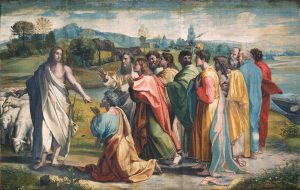Thoughts on Sunday’s Lessons for Aug. 23, 2020
First Reading (Track One): Exodus 1:8-2:10
Joseph and his family came to Egypt to escape famine, but over the generations things changed. The Hebrew people increased in numbers, but now they must toil as Pharaoh’s slaves.

Christ’s Charge to Peter (1515-1516), painting by Raphael (1483-1520). Victoria and Albert Museum, London. (Click image to enlarge.)
Evil Pharaoh, fearing this community because it has grown to threatening numbers, decides to kill all the Hebrew baby boys, a threat that scripture will later echo in Herod’s decision to kill Bethlehem’s babies after the birth of Jesus. But the baby Moses escapes in a floating basket. Moses will go on to become the next great figure in the bible’s ancestral legends, who will lead the people out of Egypt on a long trek toward the Promised Land.
First Reading (Track Two): Isaiah 51:1-6
Using a metaphor that might remind us of Jesus’ response to Peter in Sunday’s Gospel, Isaiah tells the people that they were hewn from rock and dug from a quarry in their descent from Abraham and Sarah and their children. God promised to bless Abraham and make his offspring as numerous as the stars, and that promise has been fulfilled. Even though they remain in exile now, God will deliver them; God’s justice will be a light to the people, and their deliverance will come soon. Earth may eventually wear out like a used garment and the heavens will vanish like smoke, but God’s deliverance and salvation last forever.
Psalm (Track One): Psalm 124
The Psalmist remembers the people’s deliverance from slavery in this hymn of thanksgiving to the God who carried them through the frightening exodus from Egypt. As we sing it we remember the people’s passage through the Red Sea. Then, in striking poetic imagery, the Psalm likens the people to a bird pursued by a hunter, escaping from a broken snare. The hymn concludes with joyous thanksgiving: “Our help is in the name of the Lord.”
Psalm (Track Two): Psalm 138
Echoing the hope for return from exile and eventual salvation that we heard in the Isaiah reading, Psalm 138 thanks and praises God’s love and faithfulness. When we called, the Psalmist sings, God answered us and gave us strength. The litany of praise goes on: Although God is high, God cares for the lowly; God keeps us safe when we walk in the midst of trouble. The love of the Lord endures forever and will not abandon the works of God’s hands.
Second Reading: Romans 12:1-8
Having made his case to the Christians of Rome to live and worship together in love, Paul enters the closing chapters of this, his last letter. He urges the people to devote their minds and bodies as a living sacrifice in spiritual worship: Do not live according to the customs of this world but discern and follow what is good in the will of God. Working out a beautiful metaphor that we also hear in 1 Corinthians, he imagines the church – like our bodies – as an organism made of many parts. Every part has its purpose, and they all must function well together to make the body work. Some lead, some teach, some give, some learn, some listen; some offer compassion. All together we make up one body in Christ.
Gospel: Matthew 16:13-20
This key Gospel passage appears in similar form in the Gospels of Matthew, Mark and Luke. It is a major turning point in all the Gospels, an important moment in which Jesus first acknowledges that he is the Messiah, the son of the living God. Perhaps the disciples have already begun wondering if Jesus is the Son of God. They worshipped him after he walked on the water and stilled the storm, for instance. But this is the first place in the three Gospels, just as Jesus and his followers begin their journey toward Jerusalem, when Jesus responds and agrees with Peter’s assertion that God has revealed him as the Messiah. Jesus then declares Peter “the rock” upon which he will build the church, and sternly commands the disciples not to tell anyone about this. His time has not yet come.
